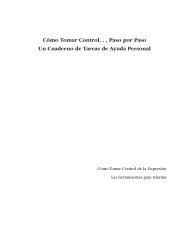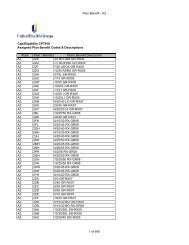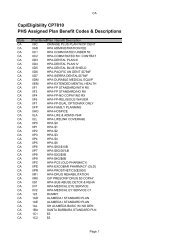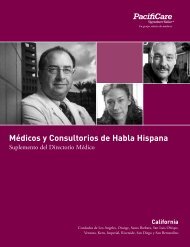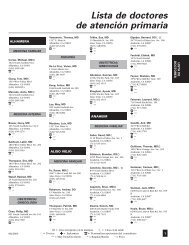CALIFORNIA - Pacificare Health Systems
CALIFORNIA - Pacificare Health Systems
CALIFORNIA - Pacificare Health Systems
Create successful ePaper yourself
Turn your PDF publications into a flip-book with our unique Google optimized e-Paper software.
PART A<br />
96<br />
Member Eligibility<br />
b. a maximum of 60 days prior to the date your<br />
Child’s enrollment transaction is completed.<br />
Change in Coverage<br />
In order to change from single to adult plus child(ren)<br />
coverage, or two adult coverage, or family coverage,<br />
or to add another Child to existing family coverage,<br />
contact the person who handles benefits at your<br />
location (or the University’s Customer Service Center if<br />
you are a Retiree).<br />
Effect of Medicare on Retiree Enrollment<br />
If you are a Retiree and you and/or an enrolled<br />
Family Member is or becomes eligible for premiumfree<br />
Medicare Part A (Hospital Insurance) as primary<br />
coverage, then that individual must also enroll in and<br />
remain in Medicare Part B (Medical Insurance). Once<br />
Medicare coverage is established, coverage in both Part<br />
A and Part B must be continuous. This includes anyone<br />
who is entitled to Medicare benefits through their own<br />
or their Spouse’s non-University employment.<br />
Individuals enrolled in both Part A and Part B are<br />
then eligible for the Medicare premium applicable to<br />
this plan. Beginning January 1, 2004, Retirees or their<br />
Family Member(s) who become eligible for premium<br />
free Medicare Part A and do not enroll in Part B<br />
will permanently lose their UC-sponsored medical<br />
coverage.<br />
Retirees and their Family Members who were eligible<br />
for premium-free Medicare Part A, but declined to<br />
enroll in Part B of Medicare before January 1, 2004,<br />
were assessed a monthly offset fee by the University<br />
to cover increased costs. The offset fee may increase<br />
annually, but will stop when the Retiree or Family<br />
Member becomes covered under Part B. Retirees or<br />
Family Members who are not eligible for premiumfree<br />
Part A will not be assessed an offset fee nor lose<br />
their UC-sponsored medical coverage. Documentation<br />
attesting to their ineligibility for Medicare Part A will<br />
be required. (Retirees/Family Members who are not<br />
entitled to Social Security and premium-free Medicare<br />
Part A will not be required to enroll in Part B.)<br />
You should contact Social Security three months<br />
before your or your Family Member’s 65th birthday to<br />
inquire about your eligibility and how you enroll in<br />
the Hospital (Part A) and Medical (Part B) portions of<br />
Medicare. If you qualify for disability income benefits<br />
from Social Security, contact a Social Security office<br />
for information about when you will be eligible for<br />
Medicare enrollment.<br />
Upon Medicare eligibility, you or your Family Member<br />
must complete a University of California Medicare<br />
Declaration. This notifies the University that you<br />
are covered by Part A and Part B of Medicare. The<br />
University’s Medicare Declaration forms are available<br />
through the University’s Customer Service Center.<br />
Completed forms should be returned to University of<br />
California, Human Resources and Benefits, <strong>Health</strong> &<br />
Welfare Administration – Retiree Insurance Program,<br />
P.O. Box 24570, Oakland, CA 94623-9911.<br />
Any individual enrolled in a University-sponsored<br />
Medicare Advantage Managed Care Contract must<br />
assign his or her Medicare benefit to that plan or lose<br />
UC-sponsored medical coverage.<br />
Medicare Secondary Payer Law (MSP)<br />
The Medicare Secondary Payer (MSP) Law affects the<br />
order in which claims are paid by Medicare and an<br />
employer group health plan. UC Retirees hired into<br />
positions making them eligible for UC-sponsored<br />
medical coverage, including CORE and mid-level<br />
benefits, are subject to MSP. For Employees or their<br />
spouses who are age 65 or older and eligible for a<br />
group health plan due to employment, Medicare<br />
becomes the secondary payer and the employer plan<br />
becomes the primary payer.<br />
Medicare Private Contracting Provision<br />
Federal Legislation allows Physicians or practitioners<br />
to opt out of Medicare. Medicare beneficiaries wishing<br />
to continue to obtain services (that would otherwise<br />
be covered by Medicare) from these Physicians or<br />
practitioners will need to enter into written “private<br />
contracts” with these Physicians or practitioners<br />
requiring the beneficiary to be responsible for all<br />
payments to such Providers. Services provided under<br />
“private contracts” are not covered by Medicare, and<br />
the Medicare limiting charge will not apply.<br />
If you are classified as a Retiree by the University (or<br />
otherwise have Medicare as a primary coverage) and<br />
enrolled in Medicare Part B, and choose to enter into<br />
such a “private contract” arrangement with one or<br />
more Physicians or practitioners, under the law you<br />
have in effect “opted out” of Medicare for the services<br />
provided by these Physicians or other practitioners. No<br />
benefits will be paid by this Plan for services rendered



